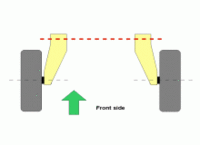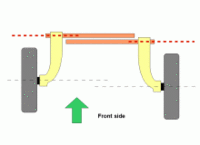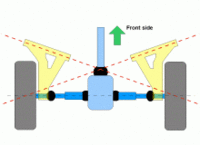Trailing arm
A trailing-arm suspension, sometimes referred as trailing-link is a vehicle suspension design in which one or more arms (or "links") are connected between (and perpendicular to and forward of) the axle and a pivot point (located on the chassis of a motor vehicle). It is typically used on the rear axle of a motor vehicle. A leading arm, as used on the Citroën 2CV and the M422 Mighty Mite, has an arm connected between (and perpendicular to, and to the rear of) the axle and the chassis. It is used on the front axle.
Trailing-arm designs in live axle setups often use just two or three links and a Panhard rod to locate the wheel laterally. A trailing arm design can also be used in an independent suspension arrangement. Each wheel hub is located only by a large, roughly triangular arm that pivots at one point, ahead of the wheel. Seen from the side, this arm is roughly parallel to the ground, with the angle changing based on road irregularities. A twist-beam rear suspension is very similar except that the arms are connected by a beam, used to locate the wheels and which twists and has an anti-roll effect.
A semi-trailing arm suspension is a supple independent rear suspension system for automobiles where each wheel hub is located only by a large, roughly triangular arm that pivots at two points. Viewed from the top, the line formed by the two pivots is somewhere between parallel and perpendicular to the car's longitudinal axis; it is generally parallel to the ground. Trailing-arm and multilink suspension designs are much more commonly used for the rear wheels of a vehicle where they can allow for a flatter floor and more cargo room. Many small, front-wheel drive vehicles feature a MacPherson strut front suspension and trailing-arm rear axle.
Some aircraft also use trailing arms in their landing gear, with oleo struts for shock absorption. A trailing arm landing gear results in smoother landings and a better ride when taxiing compared to other types of landing gear.[1]
See also
- Swingarm – the predominant type of motorcycle rear suspension, which is basically a trailing arm
- Weissach axle – a variant of semi-trailing arm suspension
References
| Wikimedia Commons has media related to Trailing-arm suspension. |
- ↑ Cook, Mark E (November 2004). "Revere the Gear: Good landings are more than ego-boosters; they're kind to your airplane's landing gear". Flight Training (Frederick, Maryland: Aircraft Owners and Pilots Association). Retrieved 19 February 2014.
| ||||||||||||||||||||||||


